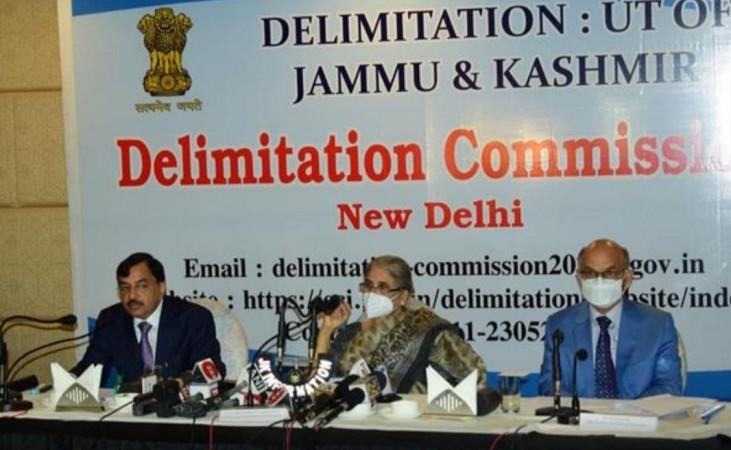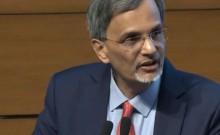The Delimitation Commission on Jammu and Kashmir has proposed six additional seats for Jammu region while one more assembly seat for Kashmir Valley, the sources said here on Monday.
The sources also said that the Commission arrived at the proposal to add more seats after the discussion with its five associate members held on Monday.
The Commission, headed by former Supreme Court Justice Ranjana Prakash Desai, had a meeting with the five Lok Sabha members from Jammu and Kashmir for the consultations and were asked to respond to the proposal by December 31 this year.
The five associate members -- Union Minister Jitendra Singh, Jugal Kishore from BJP, National Conference leader Farooq Abdullah, Justice (Retd) Hasnain Masoodi and Mohammad Akbar Lone attended the meeting.

For the first time, the Commission has also proposed to reserve nine seats for the Schedule Tribe and seven seats for the Schedule Castes in the UT, the sources further said, adding that earlier there were no reserved seats for STs and SCs.
If the recommendations are implemented, the Jammu region will have 43 seats while the Kashmir Valley will have 47 seats.
Chief Election Commissioner Sushil Chandra is an ex-officio member of the panel along with the chief electoral officer of J&K to re-structure the assembly seats in the Union Territory of Jammu and Kashmir in a view to give fair opportunity to candidates after the sizable increase in the population.

A Special Delimitation Commission was constituted on March 6, 2020 to redraw the Assembly and Parliament seats in the UT after the special status under Article 370 was revoked from the erstwhile state of Jammu and Kashmir on August 5, 2019.
The Commission met several leaders of national and regional political parties, administrators and civil society groups in Jammu and Kashmir in July and the exercise is being conducted on the basis of the 2011 census.
The key aim is to set up a Delimitation Commission to give equal representation to equal segments of the population in order to ensure a fair division of geographical areas so that all political parties or candidates contesting elections have a level playing field in terms of number of voters.
Full statement of Delimitation Commission
Today, the Delimitation Commission under the Chairmanship of Justice (Retd.) Mrs. Ranjana Prakash Desai in the august presence of Chief Election Commissioner, State Election Commissioner, Union Territory of Jammu & Kashmir met all the five Associate Members viz. Dr Farooq Abdullah, MP, DrJitendra Singh, MP. Sh Mohammad Akbar Lone, MP, Sh. Hasnain Masoodi, MP, Sh. Jugal Kishore Sharma, MP and in its second meeting with Associate Members for the purposes of delimitation of assembly constituencies in the Union Territory of Jammu & Kashmir. First such meeting was held on 18th February, 2021. The Chief Electoral Officer, Union Territory of Jammu & Kashmir was also attended the meeting.
Chairperson welcomed the Associate Members for coming forward for the meeting and hoped that this meeting would help in carrying out the work of delimitation smoothly.
Chief Election Commissioner in his remark shared the experiences of the Commission of interacting with people in the Union Territory of Jammu 8 Kashmir during its visit. He emphasized that the work of delimitation is being carried out within the overall statutory framework and keeping the interest of common people of the Union Territory of Jammu & Kashmir. He highlighted Section 9(1)(a) of the Delimitation Act, 2002 read with Section 60(2)(b) of the Jammu and Kashmir Reorganisation Act, 2019, which specifies that all constituencies shall, as far as practicable, be geographically compact areas, and regard shall be had to physical features. existing boundaries of administrative units, facilities of communication and public conveniences.
Associate Members appreciated the fact that this Commission visited the Union Territory ofJammu & Kashmir and met large number of people person. They assured that all necessary assistance would be extended in the work of delimitation.
Sh Chandra Bhushan Kumar, Senior Deputy Election Commissioner gave detail presentation on the work done. He informed that in the Union Territory, since last delimitation, number of districts has increased from 12 to 20 and number of tehsils from 52 to 207. The population density in the districts of the Union Territory varies from 29 persons per square km in Kishtwar to 3436 persons per square km in Srinagar. In the Union Territory, the administration has been allocating compensatory allowance to government officials working in the specific areas on grounds of remoteness of the place, its inaccessibility, severe inclement weather conditions, its remaining cut off from the rest of the State (now Union Territory) for a period of time, lack and gross inadequacy of medical, educational, residential and other basic amenities of life, its health hazards and similar other rigorous conditions of living. The Union Territory shares international boundary and in those locations, the inhabitants are forced to take shelter, intermittently, bunkers due to continued inhospitable and uncertain living conditions.
Thereafter, the Commission explained that taking all these into account, the Delimitation Commission has categorized all 20 districts in three broad categories A, B and C giving margin of +/- 10% of average population per Assembly Constituency (AC), while proposing allocation of the constituencies to the districts. The Commission has also, for some districts, proposed carving out of an additional Constituency to balance the representation for geographical areas having inadequate communication and lack of public conveniences due to their inhospitable conditions on the international border. For the first time, in Jammu and Kashmir, 9 (Nine) seats are proposed to be allocated for Scheduled Tribes out of 90 seats on the basis of population. Seven seats are proposed for Scheduled Castes.
The Commission shared Paper - I describing the proposed seat allocation at the level of districts with all the Members with the request to furnish their views/comments/suggestions by 31.12.2021.
The meeting ended with thanks to the Chair.

















